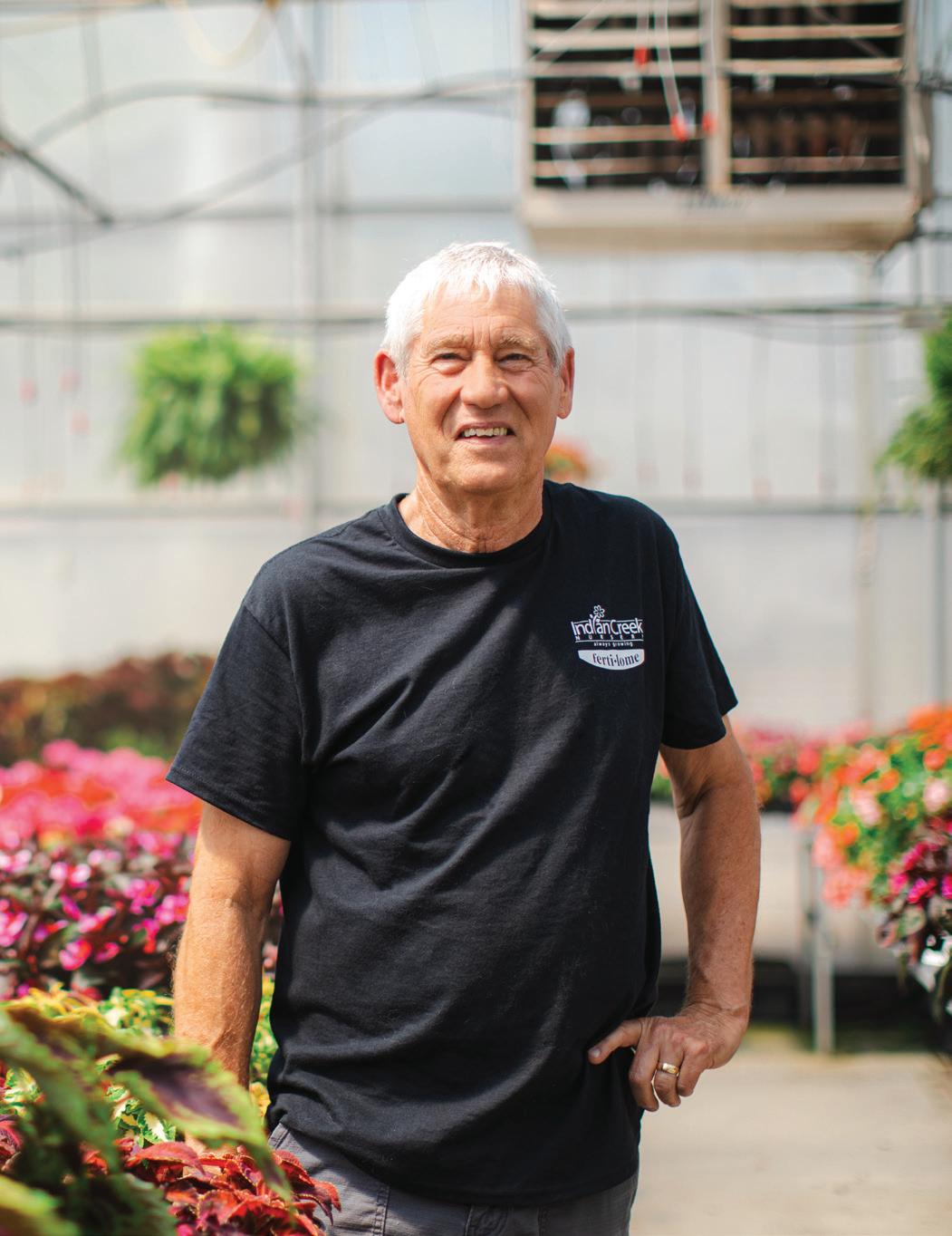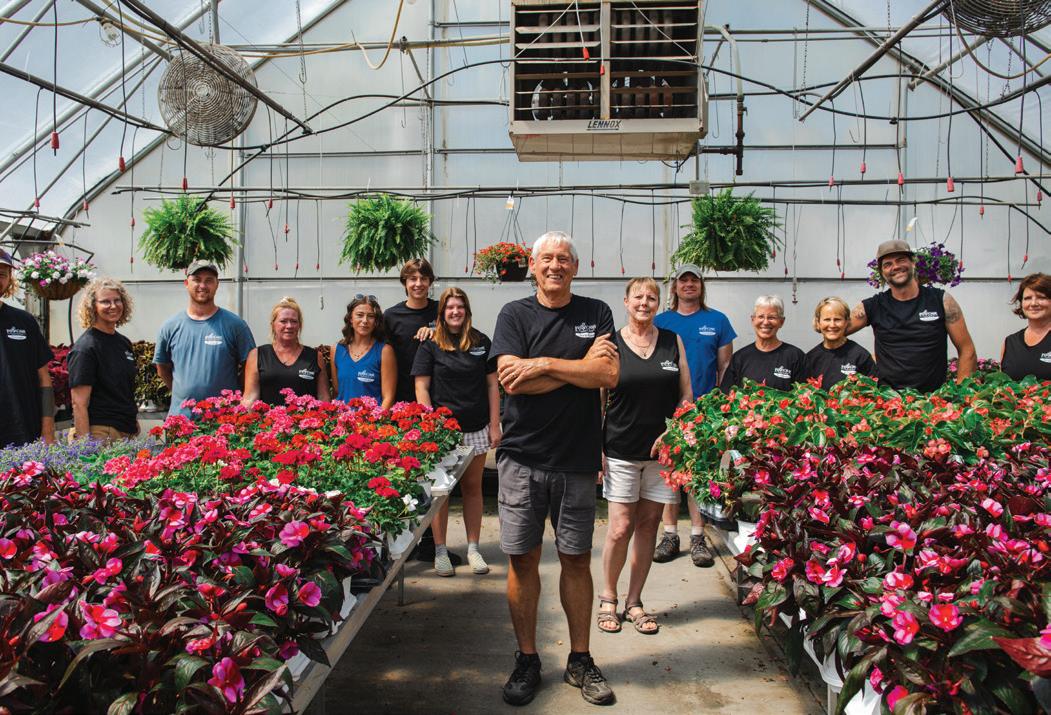
6 minute read
CULTIVATING A LEGACY BUSINESS
Local Nurseries And Garden Centers Grow And Thrive
Anyone can pick up seeds or bedding plants; tools and implements; fertilizer, pesticides, and other products from a home improvement or general merchandise retailer. DIY landscaping or gardening is far more likely to succeed, however, with a little support from the savvy and experienced staff at a longstanding nursery or garden center.
“Our team of people has always been a strong point for us and gives us an advantage over the box stores,” Indian Creek Nursery’s owner, Scott Farrington, said of the business that’s been locally owned since its founding in 1966. “We provide knowledge, assistance, and service that are not available from a large store that focuses on many things besides plants and home decor…We try to ask questions of the customer (like), How much light? What side of the house? Things of that nature. Then we try to establish the proper location for plants or the proper soil and conditions for a vegetable garden. We try to work one-on-one with the customers when they’re here.”
“We are invested in our customers,” said Amy Wenninghoff, co-owner with her husband, Paul, of Wenninghoff’s, a fourth-generation retail family farm that began in 1956 in northwest Omaha. “They become like family, and we want them to succeed… The owners of our business are always seen and available for customers to give us feedback directly.”
Wenninghoff added that she and her staff are seeing more families grow gardens and involving their children, a trend that started when people were homebound during the pandemic.
“[Gardening] is an important life skill and hobby to teach,” she said. “We love being part of that. We have increased our vegetable plant production and we are always asked growing advice now.”
Mulhall’s is another local garden center emphasizing a personal touch, said CEO Mick Mulhall, with staff who can provide guidance to help customers’ gardens and landscaping thrive. The family business was founded as Mulhall’s Landscaping & Lawn Service in the 1950s by his Irish immigrant grandparents, John and Maureen Mulhall. They originally operated out of their garage, but today Mulhall’s occupies a large property at 120th and Maple streets with recent improvements and renovations centered around a top-notch customer experience.
Horticulture was a passion of John Mulhall’s, said his grandson. The elder Mulhall grandfather not only earned a degree in botany; he was raised on a farm, worked on a peat farm, and worked for a specialty nursery while in Ireland. He hailed from County Wicklow, often called the Garden of Ireland, or in Mick Mulhall’s words, “The greenest county in the greenest country in the world.”
John and Maureen Mulhall came to Omaha in 1953, where John worked with the Omaha Parks Department and Creighton University’s building and grounds department before starting his own business.
“Cultivating the beautiful” is still a company focus today, Mulhall said. “It’s about connecting people to nature.”
These local legacy enterprises have all developed a loyal customer base.
“In 1928, the Wenninghoff family purchased the property and the city grew around us,” Wenninghoff said. “We now have lots of customers that live close by, so they shop with us weekly. We are able to keep the produce out of the sun after harvest so it stays fresh much longer than setting up under a tent on a street corner.”
The four-generation family business keeps evolving, she added.
“We grow and sell lots of produce and flowering annuals, perennials, and vegetable plants,” Wenninghoff said. “As our family changed, the business changed. When the kids were small, the produce business was small, and we were open July, August, and September. As they became older and could drive tractors, we added the pumpkin patch in October. When they became teens, we needed a way to keep them ‘out of trouble,’ so we added greenhouses to keep them busy more months of the year. Now they all have children, and our youngest son wants to continue the business; we have started the transition and will see where his family takes the business.”
I-80 Development Ground
“We have always served and built our business with the neighborhoods around our store,” Farrington said. “Omaha is a great city for a business because we seem to be insulated from large economic downturns. Our location in the middle part of the city gives us many more homeowners per square mile than in the suburbs. We have never experienced large upturns in business that might happen in the new neighborhoods, but we also have not seen dramatic downturns. The recent trend has been the building of apartment buildings near and around our location. That has created a surprising demand for houseplants, pottery, and accessories.”
Indian Creek Nursery was originally located north of Council Bluffs and named for nearby Indian Creek. In 1966, Bill Farrington and Fred Schlott, landscape architects and designers, founded the company to cultivate a 20-acre tree farm for their projects. The business expanded into landscape plants and installation, and Scott Farrington began working there full-time in the early 1970s while attending college. At age 25, he began assuming the day-to-day management of the company after the untimely deaths of both founding partners.
Farrington opened Indian Creek Nursery’s Midtown Omaha garden center on Saddle Creek Road in 1981. Retailing has now become the prime focus of the company, he said.
“Indian Creek Nursery is a grower/retail garden center. We grow nearly all of our vegetables and herbs and a substantial part of our annual flowers and perennials on site. In addition, we always have a greenhouse full of houseplants along with pottery, soils, mulches, and a full complement of pest control solutions,” Farrington said. “Combined with our location in Midtown, this gives us a unique niche as a garden center. When we first opened, we were on a very tiny piece of property, but we still operated a tree farm and landscape company from Council Bluffs. Within a couple of years, the farm was closed and we began leasing some property from the city, south of our store. The area to the south grew in size and we began building greenhouses for production and sale of plants. Several years, ago a developer constructed commercial buildings on that land and we have ended up back on a much smaller spot, but very efficient and happy.”
As rewarding as the work is, the business has its challenges, Wenninghoff said.
“[It’s difficult] finding labor for the field work,” she explained. “It is hard manual work growing produce and not many people come knocking at our door to ask if they can sweat and get dirty every day with us. We tend to have a new crew every year in the field, so it is a lot of re-training on each task.”
Pandemic-initiated supply-chain challenges have also affected the company, Wenninghoff added, but her staff is finding solutions.
“We have done a much better job of asking our customers to return the empty trays, boxes, and containers that they purchase their plants with. We get to re-use them and they get to not throw them in the landfill,” she explained. “It’s a win for all of us.”
“The most difficult thing that I deal with is managing our team, purchasing, and finances in a seasonal business,” Farrington said. “Over one-third of our annual sales occur in May.”
The sector has been affected by consumer trends, Mulhall said, and some are very positive like integrating more robust native plants that require less water and are already acclimated to the local soil. Farrington said more customers are interested in organic products, ‘waterwise’ gardening and bringing pollinator-friendly plants to their yards. He and his staff, he added, are also willing to using their home gardens and landscaping as living labs to test out new ideas.

“Our team enjoys what they do; they enjoy helping people,” he said. “They like to deal with people’s questions and situations and really just love the customers that come in…It really is a lot of fun. It’s invigorating. And even though we deal with plants, and we’re really excited about plants, we’re really a people-friendly place.”
“MY HUSBAND HAS ALWAYS SAID HE WILL NEVER RETIRE—SPOKEN LIKE A TRUE FARMER. I HAVE TO ADMIT I THOUGHT HE WAS CRAZY, BUT NOW THAT I AM 60, I AGREE WITH HIM. WE HONESTLY LOVE WHAT WE DO AND CUSTOMERS HAVE BECOME FAMILY.”
-AMY WENNINGHOFF
“My husband has always said he will never retire spoken like a true farmer,” Wenninghoff said. “I have to admit I thought he was crazy, but now that I am 60, I agree with him. We honestly love what we do and customers have become family. We couldn’t imagine not doing this.”
For more information, visit wenninghoff.com; mulhalls.com; and indiancreeknursery.com.
B2B










